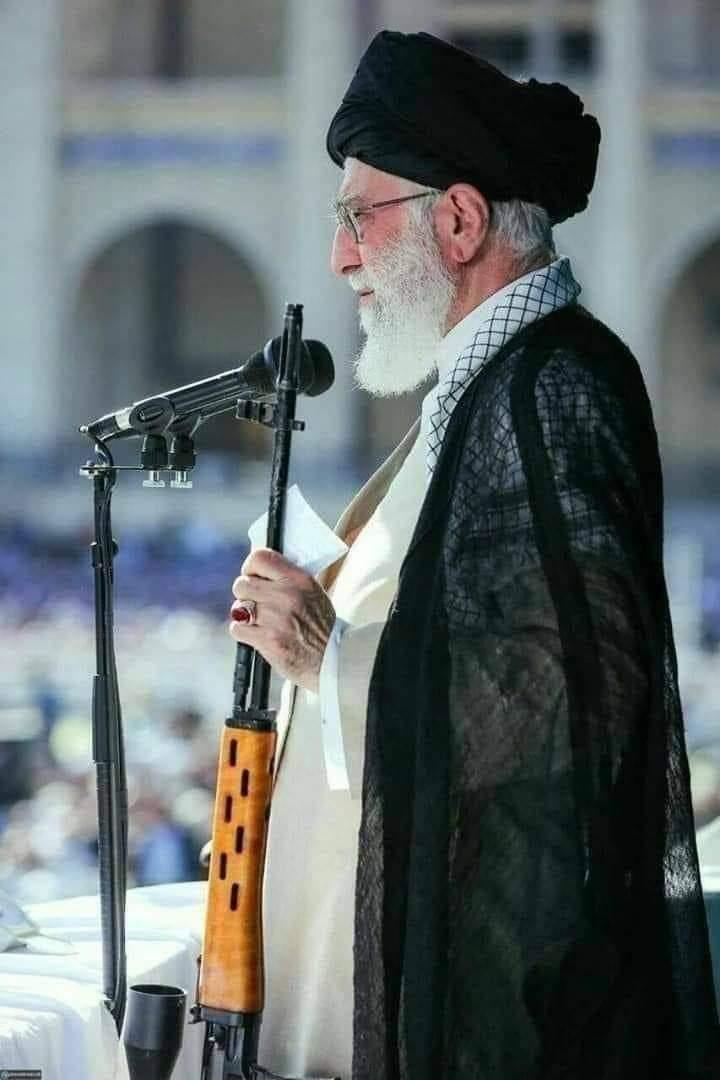Iran's Supreme Leader, Ayatollah Ali Khamenei, delivered a rare Friday sermon in Tehran, declaring that Israel "won't last long" while voicing strong support for Palestinian and Lebanese groups opposing the Israeli state. Speaking to a large gathering at the historic Imam Khomeini Mosque, Khamenei backed the ongoing missile strikes on Tel Aviv, describing them as a "public service" to the Palestinian cause.

In a speech filled with defiance, Khamenei addressed tens of thousands of supporters, emphasizing Iran's commitment to standing with Hezbollah and Hamas. "Israel will not prevail against Hamas or Hezbollah," he told the crowd, as chants of "we are with you" reverberated through the mosque. Khamenei had a gun placed beside him throughout his address, symbolizing his readiness for confrontation as he warned of Israel's downfall.
Meanwhile in #Tehran massive crowds at a historic Friday Sermon by @khamenei_ir
— Shafek Koreshe (@shafeKoreshe) October 4, 2024
Ayatollah Khamenei: From @PressTV :
🔺 Ayatollah Khamenei stresses Muslim unity
🔺... urges nations to show solidarity with people oppressed by enemy
🔺 Every nation has the right to… pic.twitter.com/5ksZsox74G
This marks Khamenei's first Friday sermon in five years, making it a significant political statement. His last sermon took place in January 2020 following Iran's retaliatory missile strikes on a U.S. army base in Iraq after the assassination of Iranian military commander Qasem Soleimani. This time, Khamenei's sermon came just days after Iran launched over 180 missiles targeting Israeli infrastructure, signaling heightened tensions in the region. The timing of his remarks, coinciding with the upcoming anniversary of the Israel-Gaza war, further underscored the gravity of the situation.
Khamenei praised Hassan Nasrallah, the former chief of Hezbollah, who was killed in an Israeli airstrike in Beirut. Describing Nasrallah as a "high-standing flag against the Zionist enemy," Khamenei expressed his belief that the Lebanese leader's death would only strengthen Hezbollah's influence. "His martyrdom will not be in vain," Khamenei assured the crowd. "We must stand against the enemy, guided by our unwavering faith and the spirit of resistance."
Hezbollah, which Iran supports financially and militarily, has been a major force in Lebanon's fight against Israel, and Khamenei referred to the group as a "blessed tree" that has flourished under Nasrallah's leadership. Khamenei also called on Muslims worldwide to support Lebanon's resistance and contribute to the fight for the al-Aqsa Mosque in Jerusalem, a site of significant religious and political importance in the Israeli-Palestinian conflict.
In his sermon, Khamenei also justified Hamas' October 7 attacks on Israel, calling them a "correct move." He dismissed any objections from international law, arguing that Palestinians and Lebanese fighters have every right to defend themselves against Israeli occupation. "No international law has the right to object to the actions of those standing up for their land and people," Khamenei stated.
The supreme leader's remarks also took aim at Israel's relationship with the United States. Khamenei called Israel a "tool" used by the U.S. to control the Middle East's lands and resources. He accused both nations of dreaming unrealistically about maintaining their influence over the region. "The Zionist entity is fake, unstable, and only exists due to American support," he said. "It will be uprooted from the ground, as it has no real roots in this region."
Khamenei's return to the Imam Khomeini Mosque, one of Iran's most significant religious sites, further highlighted the symbolic importance of the speech. The mosque played a key role in the 1979 Islamic Revolution, which led to the overthrow of the Shah and the establishment of the Islamic Republic. Previously known as the Shah Mosque, it served as a hub for dissenting voices and political movements that eventually led to the revolution.
Khamenei's choice of venue underscored the continuity of Iran's revolutionary spirit. The Imam Khomeini Mosque is still a major site for political and religious gatherings, as evidenced by the large turnout for Khamenei's speech. His sermon, filled with both political defiance and religious fervor, linked modern-day struggles in the Middle East to the revolutionary values that have shaped Iran's political landscape.
Iran remains a critical backer of both Hamas and Hezbollah, providing financial and military support in their struggles against Israel. Khamenei's speech is expected to further fuel tensions in the region, especially as Israel vows to retaliate against recent missile attacks. However, Khamenei made it clear that Iran would not back down, standing firm in its support for those fighting against Israeli occupation.
The sermon, held in the midst of escalating conflict, signals a firm stance from Iran's leadership as the situation in the Middle East becomes increasingly volatile. Khamenei's words may further harden the positions of both sides, prolonging an already complex and deeply rooted conflict.









